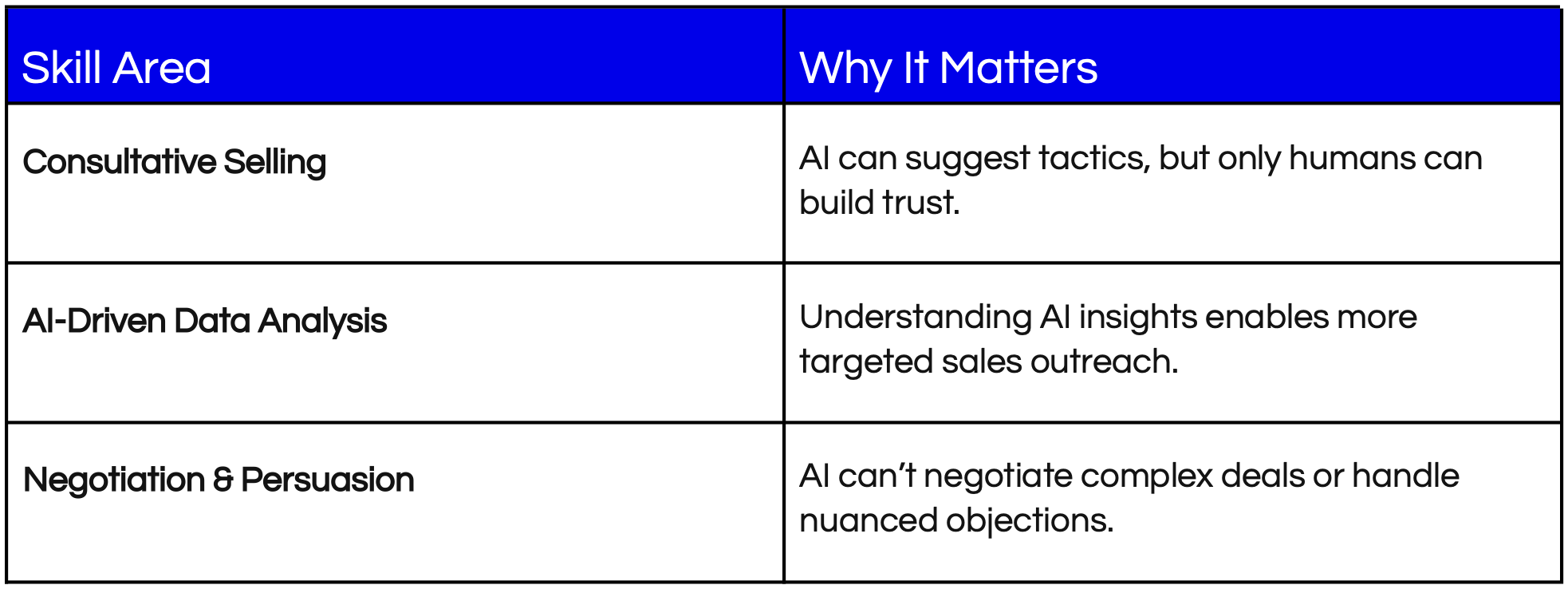
Will AI Replace Sales Jobs? Analyzing Future Trends in AI and Sales Careers
Becca Eddleman
AI is shaking up every industry, and sales is no exception.
But let’s cut through the hype – AI isn’t here to replace salespeople. Instead, it’s redefining what sales roles look like, automating tedious tasks, and allowing professionals to focus on what they do best: building relationships and closing deals.
So, will AI really replace sales jobs? Or is this just another tech-fueled panic?
Let’s dive into the current landscape, the skills that will define future sales success, and how organizations and sellers should be preparing for this shift.
The Current State of AI in Sales
How AI is currently used in the sales industry
AI is no longer a futuristic concept. It’s becoming embedded in sales workflows, automating lead generation, handling customer interactions, and even analyzing sales performance. Here are the most common areas we see AI used in Sales today:
-
- Predictive Analytics & Lead Scoring: AI analyzes buyer behavior and past sales data to identify high-potential leads. Currently, 81% of sales teams are either experimenting with or have fully implemented AI, making it a core component of modern sales strategy.
- Automated Outreach & Personalization: Generative AI tools like ChatGPT and Jasper help sales reps craft targeted emails in seconds. With 47% of sales professionals using generative AI tools for content creation, the shift toward AI-assisted messaging is well underway.
- Conversation Intelligence: AI-powered tools like Gong and Chorus transcribe and analyze sales calls, surfacing insights on prospect sentiment and deal health, giving sales teams a data-driven advantage in closing deals.
This doesn’t even scratch the surface of the capabilities of Generative AI and role-specific AI Agents that are evolving at a rapid pace. Still, these are the three areas most organizations think about when they think AI for Sales.
Related Content:
The Role of AI in Sales: The Disruptive Force Changing the Way We Sell
Traditional Sales Skills Versus Emerging AI Capabilities
The fear that AI will take over sales jobs comes from its ability to replicate and automate many traditional sales tasks, but here’s what it can’t replace:

AI is great at processing data and optimizing workflows, but it can’t replace the human intuition needed to close complex deals.
Stats on current usage/adoption and future usage/adoption
According to McKinsey, over 75% of organizations are already using AI in at least one business function, and that number is only going up.
What’s changed? Generative AI has gone mainstream. It’s no longer just the innovation teams playing with it. Entire revenue organizations are rethinking how work gets done. Companies are establishing dedicated AI task forces, reconfiguring workflows, and retraining teams to unlock genuine business value. And they’re not doing it for the hype.
The ones that are putting systems in place (governance, enablement, clear use cases) are already seeing better bottom-line results. Looking ahead, AI won’t just support sales and marketing teams; it’ll become the connective tissue between strategy, execution, and results.
Impact of AI on Sales Jobs
Identifying Sales Positions Most at Risk of Automation
As AI continues to evolve, it’s poised to take over repetitive, transactional tasks within sales roles. If your daily responsibilities involve manual prospecting, handling predictable inquiries, or routine data entry, it’s a signal to start expanding your skill set.
Embracing more strategic and consultative aspects of sales will ensure your role remains vital in an AI-enhanced landscape.
AI’s ability to handle routine tasks is growing, and will continue to take on responsibilities such as:
-
- Sales assistants & SDRs performing manual prospecting
- Customer service reps handling predictable inquiries
- Order processing & data entry roles
However, this doesn’t mean sales jobs are disappearing; it means they’re evolving.
Emerging job opportunities created by AI technologies
Rather than eliminating sales roles, AI is creating new opportunities for professionals who can leverage these tools:
-
- AI-powered sales strategists who optimize data-driven selling
- Sales automation specialists focused on CRM and AI integrations
- AI-driven customer engagement managers using insights to deepen relationships
AI-enabled teams aren’t shrinking, they’re growing. 68% of sales teams that have implemented AI added headcount in the past year, proving that AI is augmenting, not replacing, sales professionals.
The Role of Emotional Intelligence in Sales Jobs
Why Human Interaction Remains Essential in Relationship Building
Despite AI’s ability to analyze vast amounts of data, sales success still hinges on human connection and trust. Sales professionals who prioritize authentic interactions and foster rapport will continue to hold a competitive advantage. Research shows that 79% of sales professionals believe AI cannot replace human-driven relationship-building.
While AI can streamline outreach, only humans can build the genuine trust required for long-term relationships.
Understanding Customer Needs Beyond Data Interpretation
AI can analyze buying patterns, but it lacks the ability to interpret emotions, motivations, and unspoken needs. A prospect may engage with automated messages, but real sales happen when reps uncover pain points that data alone can’t explain.
A study by Vena Solutions found that AI supports, but cannot fully replace, human intuition and personalized engagement. Sales teams that strike a balance between AI-driven insights and emotional intelligence will convert at higher rates than those that rely solely on automation.
Navigating Complex Sales Negotiations With AI Support
Negotiations require strategic thinking, adaptability, and emotional intelligence – skills that AI has yet to master. While AI can provide data-backed recommendations on pricing, objections, and deal structuring, it’s ultimately human reps who can:
-
- read the room
- pivot conversations
- manage high-stakes discussions.
A report from Janek Performance Group states that AI enhances sales negotiation strategies by analyzing buyer behaviors but relies on human judgment for final decisions. Successful sellers will leverage AI for preparation, but bring their own expertise to the conversation.
Adapting to AI: How Sales Professionals Can Stay Relevant
Skills and strategies to coexist with AI
So, what’s the key to adapting and evolving to stay competitive?
Developing a hybrid skill set that leverages AI for efficiency while focusing on human strengths AI can’t replicate.
Here’s what sales professionals can focus on:
-
- Advanced Relationship-Building: Strengthen skills in consultative selling, empathy, and trust-building.
- AI-Augmented Productivity: Use AI-powered tools to streamline research, data entry, and content generation.
- Strategic Thinking & Problem-Solving: AI can provide insights, but the best salespeople know how to creatively apply them to unique buyer scenarios.
The top-performing sales leaders of the future will know how to combine AI-driven efficiency with their ability to connect, persuade, and close deals.
Training and education programs for upskilling
To stay relevant in an AI-powered sales environment, professionals should invest in ongoing training and skill development. Companies are already implementing AI literacy programs, but individuals should also take control of their own upskilling.
Key Areas for AI-Sales Training:

Many online platforms now offer courses on AI-integrated sales strategies, ensuring that professionals stay ahead of automation trends.
Additionally, sales teams can benefit from:
-
- Workshops on AI-driven selling techniques
- Live role-playing sessions integrating AI-generated data insights
- Company-sponsored AI training and certification programs
By continuously upskilling and adapting, sales professionals can ensure they remain indispensable in a world where AI is becoming a key part of the sales process.
Organizational Transformations with AI Adoption
The shift to AI-supported sales doesn’t just impact tools. It reshapes how teams are built, how roles are defined, and how companies align strategy with execution.
Changes in sales team structures and strategy
We’re entering a phase where AI isn’t just a plug-in to the sales stack, it’s a forcing function for structural change.
The traditional model, where Sales Development Reps (SDRs) generate leads, Account Executives (AEs) close them, and Sales Ops manages systems, will evolve into leaner, more integrated teams that rely on AI to automate handoffs and streamline execution. AI is handling tasks that used to require an army of reps. As a result, the shape of modern sales teams is shifting.
-
- Reps are evolving into domain experts who heavily rely on AI for research, administration, and content creation, but still own the relationship and consultative sales.
- Teams are shrinking in size but increasing in scope, supported by AI automations that work across outreach, CRM updates, and pipeline progression.
- Sales Enablement and RevOps functions are becoming a connective tissue: overseeing tooling, workflow optimization, and insights to drive performance.
This isn’t about removing the human from sales. It’s about amplifying the right ones. Strategy is no longer something a CRO reviews once a quarter. It’s a living system that adapts in real time, based on what AI reveals about pipeline velocity, market conditions, and rep behavior.
How companies manage the transition to AI-supported sales operations
Transitioning to an AI-supported sales model isn’t a tech decision; it’s a people and process one. The teams that get this right don’t roll out AI with a blanket mandate. They approach it like any strategic transformation: with alignment, experimentation, and iteration.
-
- Start with a specific pain point. Whether it’s lead qualification, admin time, or inconsistent follow-up… focus in on a challenge where AI can prove value fast.
- Pilot with real metrics. Deploy in one region, one use case, or one team. Measure lift in conversion, velocity, or time savings – not just AI usage.
- Over-communicate expectations. AI tools can feel like black boxes. Sales teams need to understand how they operate, where the data originates, and how it integrates into existing workflows.
- Train differently. New AI tools require new onboarding. That includes prompts, scenarios, and success metrics. Upskilling here is not optional. It’s how you avoid underutilized tech.
Companies that approach AI adoption as a complete culture shift, not a software update, are seeing the highest return on investment. This is where sales moves from tactical execution to system-led growth. And the teams that adapt early will build resilience, regardless of how the market shifts next.